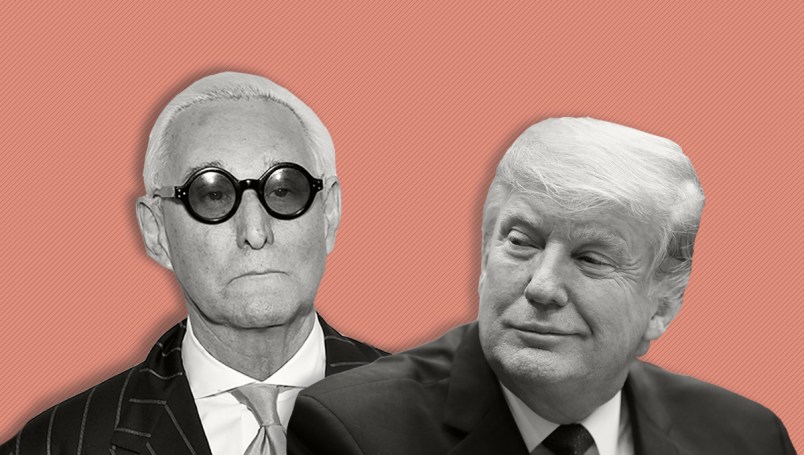Tierney Sneed contributed reporting.
The un-redacted portions of the Mueller report on the Trump campaign’s Wikileaks outreach paint a picture of a campaign with foreknowledge about the release of emails stolen from Hillary Clinton Campaign Chairman John Podesta.
In general, the report confirms a public perception that Trump’s campaign was extremely interested in, and made attempts to benefit from, hacked Democratic emails that would be published by Wikileaks.
“The Trump Campaign showed interest in WikiLeaks’s release of hacked materials throughout the summer and fall of 2016,” reads the top of the report’s subheading titled “Trump Campaign and the Dissemination of Hacked Materials.”
Much of what follows is blacked out with the annotation “Harm to Ongoing Matter,” likely due to the open and ongoing case against Roger Stone, who long bragged of a connection to Wikileaks and foreknowledge of its second email dump.
Donald Trump
Perhaps most tantalizingly, after a redacted portion of a sentence, the report stated that shortly after a call with an unidentified person, “candidate Trump told [Manafort deputy Rick] Gates that more releases of damaging information would be coming.” And later: “Trump also expressed skepticism that Russia had hacked the emails at the same time as he and other Campaign advisors privately sought information [redacted] about any further planned WikiLeaks releases.”
Trump, the report said earlier, citing Gates, was “generally frustrated that the Clinton emails had not been found.”
Then-campaign chairman Paul Manafort told Mueller’s office, the report stated, that after Wikileaks’ initial July release of stolen DNC emails, “Manafort also spoke with candidate Trump” — but the rest of the sentence is redacted.
“Manafort recalled that Trump responded [during a discussion after Wikileaks’ July email dump] that Manafort should [redacted] keep Trump updated,” the report said at a later section, after noting earlier: “Manafort also [redacted] wanted to be kept apprised of any developments with WikiLeaks and separately told Gates to keep in touch [redacted] about future WikiLeaks releases.”
It’s difficult to say with certainly, but this section may be referring to what an earlier Mueller court filing referred to as occurring sometime after the July 22 email release: “a senior Trump Campaign official was directed to contact STONE” about what else WikiLeaks had.
Citing Gates, the report stated the Trump campaign “was planning a press strategy, a communications campaign, and messaging based on the possible release of Clinton emails by WikiLeaks.”
Jerome Corsi
The report also detailed Roger Stone associate Jerome Corsi’s communications with Ted Malloch, a fixer of sorts in London. Malloch, Mueller’s report said in a footnote, “denied ever communicating with Assange or WikiLeaks, stating that he did not pursue the request to contact Assange because he believed he had no connections to Assange.”
However, the report stated that “In one conversation in or around August or September 2016, Corsi told Malloch that the release of the Podesta emails was coming, after which ‘we’ were going to be in the driver’s seat.”
On the day this tranche of Podesta emails was about to be released, Corsi claimed to have told a conference call of members of the right-wing WorldNetDaily news site “to reach Assange directly,” in the report’s words, and that “the Access Hollywood tape was coming.”
Corsi “stated that he was convinced that this efforts had caused WikiLeaks to release the emails when they did.”
However, Corsi’s testimony appears less-than-reliable: After recounting what Corsi claimed to have done, the report stated that Corsi “then said that maybe he did nothing.”
Mueller’s office investigated Corsi’s allegations about the day Podesta’s emails were released and “found little corroboration for his allegations about the day,” but, the report hedged, “the Office has not identified any [WND] conference call participant.”
Don Jr.
The report also included a page detailing Donald Trump Jr.’s “interaction with WikilLeaks”: a Twitter direct message to Trump from Wikileaks about a website called “PutinTrump.org,” to which Wikileaks had received the password.
Per the report, Trump Jr. told “a variety of senior campaign staff” about the DM. Trump Jr. then told Wikileaks in a DM: “Off the record, I don’t know who that is but I’ll ask around. Thanks.”
Trump Jr. also affirmed to Wikileaks that he’d spread a link on a report on Hillary Clinton advocating a drone strike against Assange: I “had done so,” he told Wikileaks, after Wikileaks asked him for help disseminating the link. Later, after messages from Wikileaks containing a link to wlsearch.tk, Trump Jr. tweeted the link himself.
This post has been updated.







And more damaging info will be coming…
Not soon enough for me…
I hear you…In terms of absolute danger this Republic has faced, the Trump Era (Nov, 2016 to the present) is longer than the time span between Dec. 7, 1941 until spring 1944…by which time the Allies were fairly secure in their projections of ultimate victory.
Upvoted because you know your history, emiliano!
The obstruction was just a little bit too effective, the collusion a little bit too subtle, and the deniability just a touch too plausible, to prove it in court. But it’s plenty well proven at election time. Throw out the whole, stinking Grand Old Politburo.